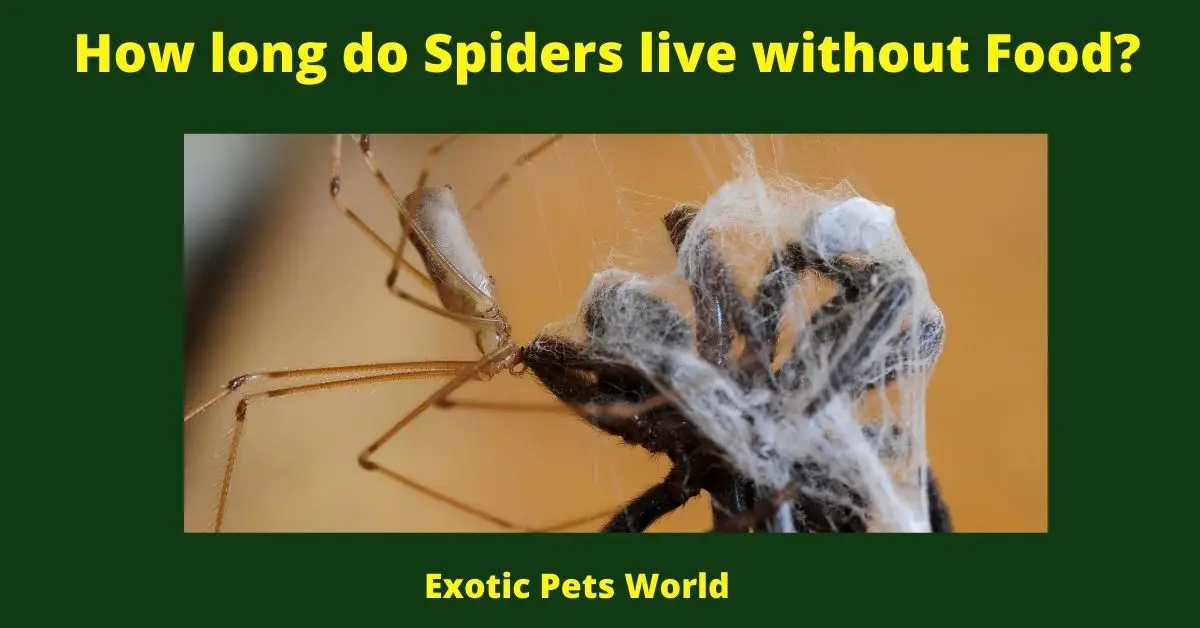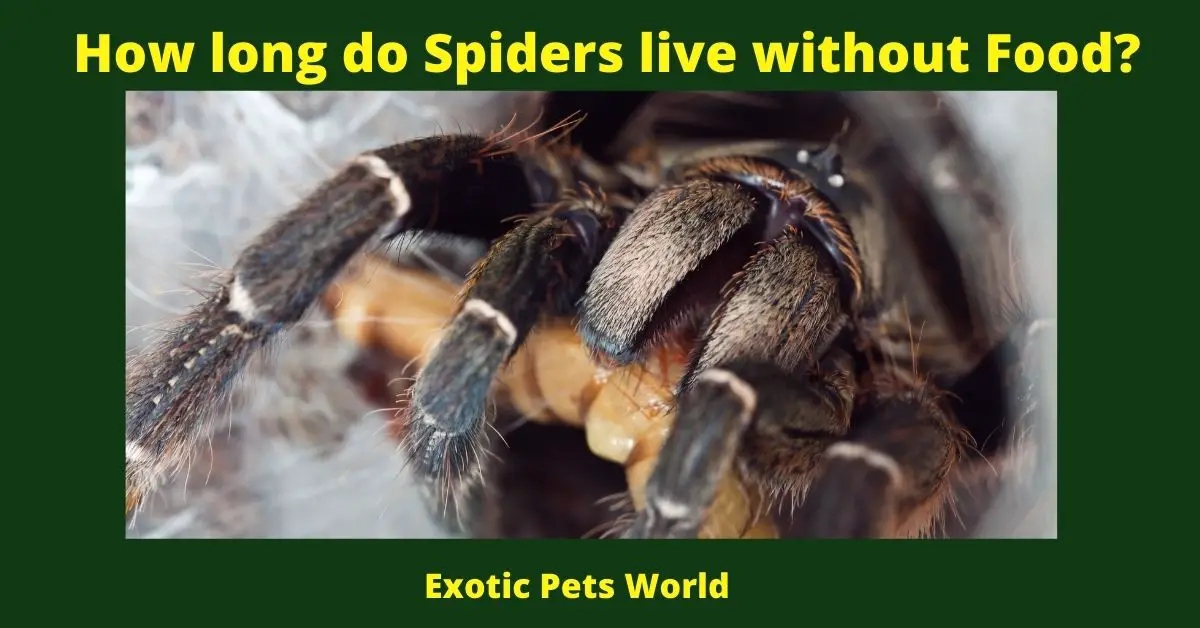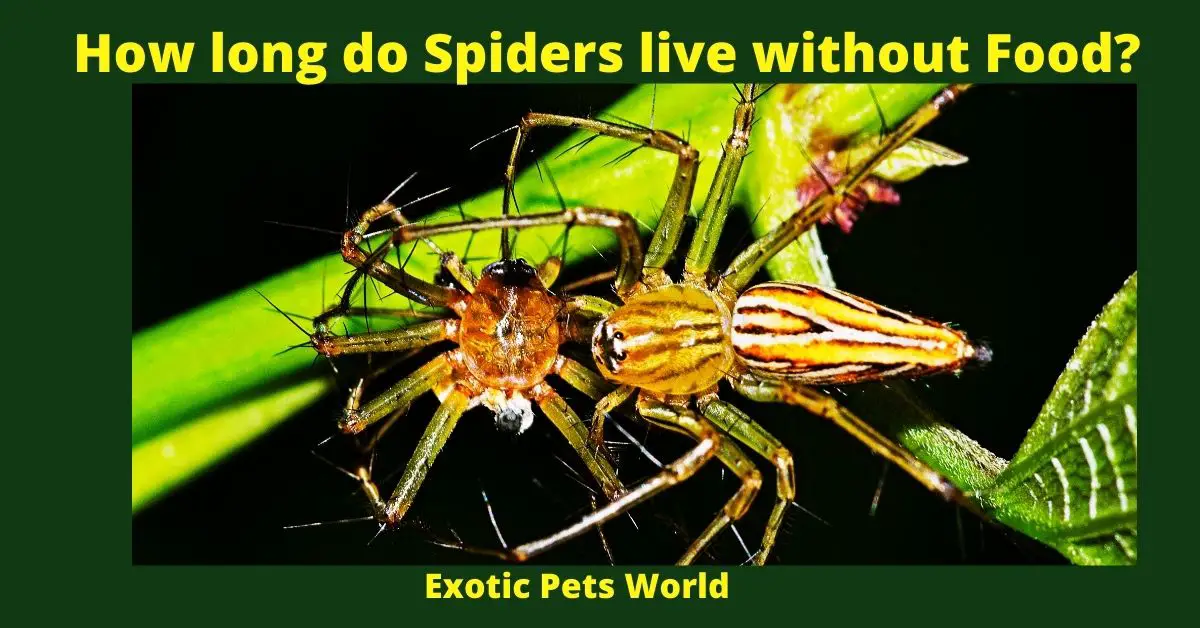Spiders can go without for from 3 Weeks – to 2 Years. Some can live up to two years without eating anything at all! Of course, this varies depending on the size and type of spider, as well as the available food sources in its environment. But in general, Spiders are fairly adaptable when it comes to what they’ll eat
How long do Spiders live without Food?
Do you know how long spiders can live without food? Believe it or not, some spiders can go for months without eating a thing! In this blog post, we will explore the different life spans of spiders based on their diet. We will also discuss some of the methods that spiders use to survive without food. Stay tuned to learn more about these amazing creatures!
What do Spiders Eat?
Spiders eat a variety of different things, depending on the species. Some spiders eat insects, while others feast on small animals like lizards or frogs. There are even some spiders that eat other spiders! How long do Spiders live without Food?
Most spiders can go for quite a while without food though. Some can live up to two years without eating anything at all! Of course, this varies depending on the size and type of spider, as well as the available food sources in its environment. But in general, Spiders are fairly adaptable when it comes to what they’ll eat.
Some of the things spiders catch and eat are?
- Flies
- Mosquitoes
- Crickets
- Grasshoppers
- Beetles
- Dragonflies
- Lizards
- Frogs
- Small snakes
- Birds?
- Some spiders even catch and eat fish! There are a few species of spider that live near water, and they will capture small fish or tadpoles to eat. These spiders have specially adapted webs that allow them to stay afloat while they’re fishing.

How Long can They go without Food?
Spiders can live without food for quite some time. They will typically go into a dormant state where they will not eat and will conserve their energy until they find food again.
Depending on the species of spider, they may be able to live without food for anywhere from weeks to months. Some spiders have even been known to survive up to two years without any sustenance!
- How Long can Black Widows go without Food? – Black widows can typically go without food for about a month.
- How Long can Brown Recluse go without Food? – Brown recluses can typically go without food for about two months.
- How Long can Garden Spiders go without Food? – Garden spiders can typically go without food for about three weeks.
- How Long can Wolf Spiders go without Food? – Wolf spiders can typically go without food for about four weeks.
- How Long can Daddy Long Legs go without Food? – Daddy’s long legs can typically go without food for about six months. However, they are able to scavenge for food if needed and will not die from starvation.
- While spiders can go without food for quite some time, it is not recommended to do so. It is always best to provide your spider with a diet that consists of both live and dead insects.
How Long do Spiders live in the Wild?
In the wild Spiders, lifespan is determined by a number of factors including weather, food availability, and predators. Studies have shown that some spiders can live up to two years without food, but on average most spiders will only survive for around six months.
This is due to the fact that Spiders need to eat in order to produce webs, and without webs, they are unable to catch prey.
Studies have also shown that Spiders who live in captivity often have a longer lifespan than those in the wild, as they are able to feed regularly. In some cases, spiders have been known to live for up to five years when kept in captivity.
This is because captive spiders aren’t as susceptible to predators or bad weather conditions, and they also have a constant food supply.
What affects Spider Lifespan?
There are many environmental factors that affect the length of their lives
- Predators – the biggest threat to spiders is being eaten by other animals.
- Parasites – These are tiny creatures that live off of the spider and can shorten their lifespan.
- Weather – extremes in temperature or humidity can be harmful to spiders.
- Food availability – if there is not enough food available, spiders will die sooner than they would otherwise.
- Age – older spiders typically have shorter lifespans than younger spiders.
- Heat – when spiders are exposed to high levels of heat, they can die. They will usually expire at a temp of 113 degrees Fahrenheit.
- Cold-spiders can also die from exposure to cold temperatures. They usually expire when their body temp reaches 29 degrees Fahrenheit.
- Food supply – types of food that spiders can capture and eat also affect their lifespan.
- Diseases – Diseases that plague spiders are often lethal.
- Habitat shrinkage – if a spider’s natural habitat shrinks, it will likely die.
Do all Spiders need to Eat to Survive?
Most Spiders do need to Eat in order to Survive, but there are a few species of Spiders that can go for extended periods of time without food. The Australian Huntsman Spider, for example, can live up to nine months without eating. Male Wolf Spiders also don’t need to eat as often as their female counterparts; they can live for up to five months without food.
However, most Spiders will eventually die if they don’t eat, since their primary source of energy is the food that they catch. The average Spider can survive about two or three weeks without eating.
What Parts of their Prey do Spiders Eat?
Spiders eat different parts of their prey depending on the type of spider. Some spiders, such as the wolf spider, eat the entire prey including the bones and fur. Other spiders, such as the black widow, eat only the softer tissues such as muscles and organs.
Some people think that spiders are cannibals and will eat other spiders, but this is not true. Spiders typically only eat insects and other small invertebrates. They are not interested in eating larger prey that would be too difficult to digest.
Why do some Spiders wrap their Prey in Webs?
Spiders that wrap their prey in webs do so to immobilize them. The web will trap the prey and the spider can then come back and eat it at its leisure. This is a very successful hunting strategy for spiders, as most of their prey are unable to escape once they are caught in the web.
Some spiders also use this technique to store food for later. By wrapping their prey in webs, they can keep it fresh and safe from other predators.
How Long Can A Spider Survive In A House?
A spider can live without food for about a month. However, if the spider is deprived of water, it will only survive for about two weeks. If you are trying to get rid of spiders in your house, you should remove their food source as well as their water source. This will help reduce the number of spiders in your home.
Spiders can also live for a long time without food if they are in a safe place. If you have a spider living in your home, you should try to find a way to safely trap it and release it outside. Spiders play an important role in the environment, so please do not kill them unless there is no other option.
A Spider in the House with plenty of food and water can live its complete life cycle and multiply.
The spider you see in webbing is the final stage of its life cycle, it has already reproduced. The spider that hatched from the egg will go through all these stages and so on.
Spiders can live up to two years under perfect conditions.
In the wild, they may only live for a few months.
How Long Do Spiders Take To Starve?
With no food and water available, most spiders will die within two weeks. However, some species can last up to a month without sustenance.
The amount of time a spider can live without food also depends on its size and age. Juvenile spiders typically have a higher mortality rate than adults, since they need more energy to grow. And small spiders usually expire sooner than large spiders, because they have less stored energy.
Interestingly, some spiders can go into a dormant state called “diapause” when food is scarce. During this time, the spider’s metabolism slows down and it can live for months without eating. Some researchers believe that diapause may help spiders survive long winters or droughts.
What does Diapause in Spiders mean?
Diapause is a state of inactivity and metabolic suspension that some animals go into during times when food is scarce. It can last days, weeks, or even months. This allows the animals to save energy until conditions are more favorable for them to resume normal activities.
For spiders, diapause usually occurs during winter when they’re not able to find food. It can also happen during times when they’re molting and have a limited supply of food. By going into diapause, spiders can extend their life span by several months. Without it, they would only survive for a few weeks or months.
Which Spider Can Survive 2 Years Without Food?
There are a few different types of spiders that can survive for an extended period of time without food. The Australian tarantula, the Chilean rose hair tarantula, and the Goliath birdeater spider are all capable of living for up to two years without eating. This makes them interesting creatures to study for scientists who are looking into methods of extending human life spans.
While all three of these spiders can survive for a long time without food, the Australian tarantula is the only one that can live in complete darkness. The Chilean rose hair and Goliath birdeater spiders both need some light to survive. This means that if you were to take away their food source and put them in a dark room, they would eventually die.
Do Spiders Die In The House?
Yes, spiders can die in the house. They may go for a long time without food, but eventually, they will starve to death. This is why it is important to keep your house free of webs and pests that could be potential food sources for spiders. You don’t want them dying in your home! If you have an infestation, be sure to get professional help.
Should I Just Leave The Spider In My Room?
Spiders can live for months without food, so you don’t need to worry about leaving them in your room. In fact, if you try to remove the spider, it may become defensive and bite you. Instead, just let the spider be and it will eventually go away on its own. If you’re still uncomfortable with having a spider in your room, try to find a way to humanely relocate it outside.
You can scoop it into a box. or also suck it up with a vacuum cleaner. Be sure to release it into an area where it will be safe and where it can catch food on its own. Spiders are an important part of our ecosystem, so we should do our best to coexist peacefully with them!

How Long Can A House Spider Live Without Water?
A spider can live up to two weeks without food, but it will die within a week if they don’t have water. This is because spiders need water to produce silk. Without water, they can’t make webs or catch prey.
Spiders are able to go for long periods of time without food by digesting their own webs. They eat the web when they catch prey, so they don’t need to eat as often. This also means that spiders can survive in areas where food is scarce.
Final Thoughts – How long do Spiders live without Food?
Most spiders can go for quite a while without food though. Some can live up to two years without eating anything at all! Of course, this varies depending on the size and type of spider, as well as the available food sources in its environment. But in general, Spiders are fairly adaptable when it comes to what they’ll eat.

I don’t think the title of your article matches the content lol. Just kidding, mainly because I had some doubts after reading the article.